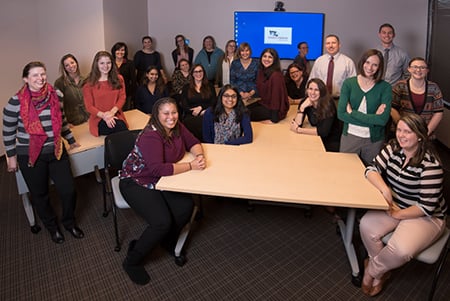

The Center for Autism Spectrum Disorders (CASD) conducts a variety of research studies, investigating the genetic, neurocognitive, behavioral, gender-related and social factors associated with autism. We are always seeking participants, including both children on the autism spectrum as well as typically-developing peers.
The research team at the Center for Autism Spectrum Disorders (CASD) in Children’s National Research Institute includes clinical psychologists, neuropsychologists and speech-language pathologists. The research mission of CASD is to enhance the lives of autistic people through translational and community-based research.
The CASD research team collaborates with the Autistic Self Advocacy Network, the Autism Women & Nonbinary Network, Patient-Centered Outcomes Research Institute, the National Institute of Mental Health, and the Organization for Autism Research.
CASD team photo

The Center for Autism Spectrum Disorders focuses on:
- Autism spectrum disorders and broader neurodiversity
- Executive functioning and intervention development across the lifespan
- Understanding and supporting transition to adulthood for autistic teens
- Cognitive phenotypes and gender and assigned sex differences
- Gender diverse and Intersex youth development
- Addressing disparities in access to care
- Sharing evidence based practiced with the community


Current Research Studies
study
Genetics and Behavioral Research
We are studying the relationship between genes and key cognitive and behavioral features in youth with and without autism.
Study
Neurodiversity and Gender Development
This study focuses on the relationship between the experience of being transgender, gender exploring or gender non-binary in youth and behavioral and biological measures of gender.
study
Using MRI Technology to Study Executive Functioning
Using MRI technology, we expect to pinpoint the parts of the brain that are responsible for executive functioning (EF) challenges.






